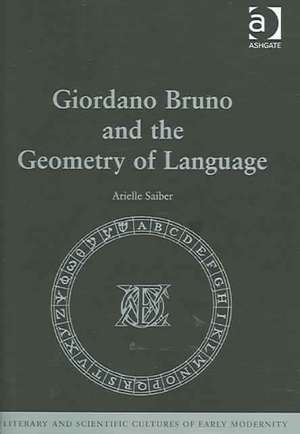Giordano Bruno and the Geometry of Language: Literary and Scientific Cultures of Early Modernity
Autor Arielle Saiberen Limba Engleză Hardback – 20 ian 2005
Din seria Literary and Scientific Cultures of Early Modernity
- 23%
 Preț: 322.12 lei
Preț: 322.12 lei - 16%
 Preț: 338.06 lei
Preț: 338.06 lei - 26%
 Preț: 822.01 lei
Preț: 822.01 lei - 25%
 Preț: 324.84 lei
Preț: 324.84 lei -
 Preț: 469.34 lei
Preț: 469.34 lei -
 Preț: 469.34 lei
Preț: 469.34 lei - 18%
 Preț: 1120.23 lei
Preț: 1120.23 lei - 16%
 Preț: 260.73 lei
Preț: 260.73 lei -
 Preț: 469.34 lei
Preț: 469.34 lei -
 Preț: 489.26 lei
Preț: 489.26 lei - 13%
 Preț: 309.88 lei
Preț: 309.88 lei -
 Preț: 489.26 lei
Preț: 489.26 lei -
 Preț: 489.26 lei
Preț: 489.26 lei -
 Preț: 389.38 lei
Preț: 389.38 lei - 26%
 Preț: 765.59 lei
Preț: 765.59 lei - 26%
 Preț: 792.44 lei
Preț: 792.44 lei
Preț: 764.45 lei
Preț vechi: 1102.91 lei
-31% Nou
Puncte Express: 1147
Preț estimativ în valută:
146.27€ • 152.72$ • 121.06£
146.27€ • 152.72$ • 121.06£
Carte tipărită la comandă
Livrare economică 04-18 aprilie
Preluare comenzi: 021 569.72.76
Specificații
ISBN-13: 9780754633211
ISBN-10: 0754633217
Pagini: 200
Dimensiuni: 153 x 219 x 19 mm
Greutate: 0.47 kg
Ediția:1
Editura: Taylor & Francis
Colecția Routledge
Seria Literary and Scientific Cultures of Early Modernity
Locul publicării:Oxford, United Kingdom
ISBN-10: 0754633217
Pagini: 200
Dimensiuni: 153 x 219 x 19 mm
Greutate: 0.47 kg
Ediția:1
Editura: Taylor & Francis
Colecția Routledge
Seria Literary and Scientific Cultures of Early Modernity
Locul publicării:Oxford, United Kingdom
Cuprins
Contents: Introduction; Axioms: Part I: theories of geometric space and form in literature pre-Bruno; Part II: theories of geometric space and form in literature post-Bruno; Foci: Brunophilia, Brunophobia; Bruno and geometry; Bruno and language; Lines: The Candle Bearer; Lists: brachylogia and systrophe; Diversion: hyperbaton; Angles: The Heroic Frenzies; Contradiction: oxymoron and syneciosis; Intersection: chiasmus and syllepsis; Reflection: epanodos and traductio; Curves: The Ash Wednesday Supper; Hyperbola-hyperbole; Ellipse-ellipsis; Circle-circumlocution; The point; Bibliography; Index.
Notă biografică
Arielle Saiber, Assistant Professor of Italian Literature, Bowdoin College, USA.
Recenzii
'Giordano Bruno has found in Arielle Saiber an interpreter most suited to his geometrical-rhetorical prose. She can mirror and match his rhetorical mode and couple this with a thorough knowledge of the mathematics of Bruno's day... Her interpretation of his work rests on impressive erudition: a familiarity with all of his published works, their various editions and translations (along with the critical literature these have evoked), knowledge of ancient and modern literary criticism and rhetoric, and relevant studies in the history of science... Saiber demonstrates convincingly that Bruno's metaphysical geometry generated his choice of figures, and her fecund interpretation of his work will surely lead to further explorations.' Renaissance Quarterly '... a study that is as rewardingly rich and strange as its subject... this book has great potential as a text in a graduate-level History or English seminar, particularly one focused on the history of language and ideas. Scholars of Italian history and language - like Saiber - will likewise see rewarding uses for this book... she amply succeeds in convincing her reader that Bruno understood in deep and profound ways that geometry is a part of language and as such a useful tool for visualizing, conceiving and expressing language in form and concept. Those interested in exploring the common language of literature, rhetoric and mathematics [...] will find much rewarding material to reflect upon Saiber's compelling, highly readable study.' Early Modern Literary Studies '... astonishingly original text... Though Bruno is always difficult reading, this volume's extraordinary lucidity makes us forget that characteristic... Saiber's own language is as magical as the realms to which she transports us... This intelligent commentary is as illuminating and provocative as it is unpedantic. In the introduction Saiber tells her readers that she aims to write a book of which Giordano Bruno would approve. She has managed, in th
Descriere
Giordano Bruno and the Geometry of Language brings to the fore a sixteenth-century philosopher's role in early modern Europe as a bridge between science and literature, or more specifically, between the spatial paradigm of geometry and that of language. Through analysis of Bruno's writings, Saiber exposes the verbal geometry of his language, and shows how his writing necessitates a crafting of space, and is, in essence, a lexicon of spatial concepts. This study constitutes an original contribution both to scholarship on Bruno and to the broader fields of early modern scientific and literary studies.
